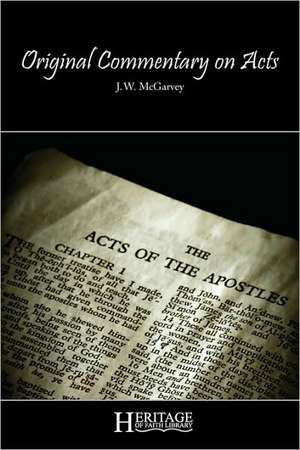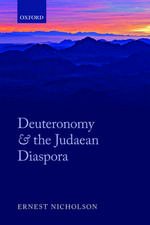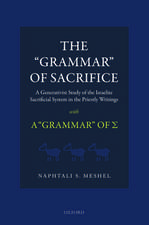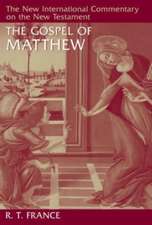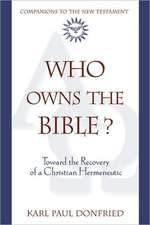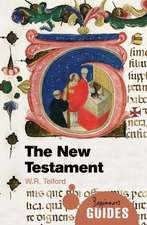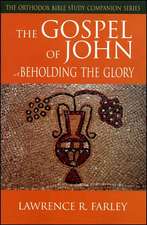Original Commentary on Acts
Autor J. W. McGarveyen Limba Engleză Paperback – 26 oct 2009
| Toate formatele și edițiile | Preț | Express |
|---|---|---|
| Paperback (2) | 121.84 lei 6-8 săpt. | |
| DeWard Publishing – 26 oct 2009 | 121.84 lei 6-8 săpt. | |
| Gospel Advocate Company – | 134.94 lei 6-8 săpt. |
Preț: 121.84 lei
Nou
Puncte Express: 183
Preț estimativ în valută:
23.32€ • 24.25$ • 19.25£
23.32€ • 24.25$ • 19.25£
Carte tipărită la comandă
Livrare economică 14-28 aprilie
Preluare comenzi: 021 569.72.76
Specificații
ISBN-13: 9780981970332
ISBN-10: 0981970338
Pagini: 346
Dimensiuni: 152 x 229 x 20 mm
Greutate: 0.51 kg
Editura: DeWard Publishing
ISBN-10: 0981970338
Pagini: 346
Dimensiuni: 152 x 229 x 20 mm
Greutate: 0.51 kg
Editura: DeWard Publishing
Notă biografică
JOHN W. MCGARVEY was born in Hopkinsville, Ky., March 1, 1829. His father was a native of Ireland, and did not move to this country until he was grown. He located in Hopkinsville, Ky., where he was married to a Miss Thompson, who was born and reared near Georgetown, Ky. When J. W. McGarvey was four years old, his father died, and his mother afterwards married Dr. G. F. Saltonstall. In 1839 the family removed to Tremont, Tazewell county, Ill., where our future teacher, preacher and author was trained to habits of industry, and thoroughly instructed in the primary and academic branches by Mr. James K. Kellogg, a successful educator of the place.
In April, 1847, in his eighteenth year, he entered Bethany College, and graduated with honors in the year 1850, delivering the Greek speech. While at Bethany he confessed faith in Christ, and was baptized by Prof. W. K. Pendleton. Immediately upon his conversion, his mind turned toward the ministry, and it was not long before he gave good evidence of fitness for the work. In the meantime his family had removed to Fayette, Mo., at which place, soon after leaving college, he taught a male school for ten months. His step-father died of cholera in June, 1851, while on his way to attend Commencement at Bethany College, of which he was a warm friend, leaving it a child's part in his estate, besides having given $2,500 while he was living.
At the call of the church in Fayette, Bro. McGarvey gave up the school there, and in September, 18,31, was ordained to the work of the ministry, and continued his labors for the church there and in neighboring county churches until February, 1853, when he removed to Dover, LaFayette county, In March, 1853, he was married to Ottie F. Hix, of Fayette. He resided at Dover nine years, dividing his time with the home church and preaching extensively over the State of Missouri. He also held five religious discussions with representatives of various religious parties during this period, and collected money to erect a boarding school in his village, which he conducted two years.
In the spring of 1862 he accepted the pastoral care of the church in Lexington, Ky., where a large field of usefulness was open to him. During the same year he published his "Commentary on Acts," which had been in course of preparation for more than three years--a work which yet holds its place in our literature as a work of superior merit. On the removal of Kentucky University to Lexington in 1865, he accepted a chair in the College of the Bible, but still maintained his labors for the Church, which had greatly prospered under his care. In 1866, he resigned his place in the Church to give his whole time to the work in the University, but continued to share its pulpit for a time with President Graham, until L. B. Wilkes was chosen as his successor. He then preached three years for country churches in connection with his other labors. When in 1869 the growth of the Lexington Church required the organization of a second one, he was called to serve that congregation, which he did for eleven years. During that time the Church increased its membership from 126 to 400. He then resigned his work in the city, on account of his college duties, and resumed country preaching.
In order to better qualify himself for his college work, the teaching of sacred history, be made a tour of Palestine in 1879, and in 1881 published the result of his observations in "Lands of the Bible," a work which for its pains-taking accuracy, and clearness of description, has received high commendation from Biblical scholars. In 1886 he published Volume I. of a work on Christian Evidence, entitled "Text and Canon;" and this was followed in 1891 by Volume II., "Credibility and Inspiration of the Bible." These works bear the marks of conscientious and careful investigation, and received favorable notice from various sources.
